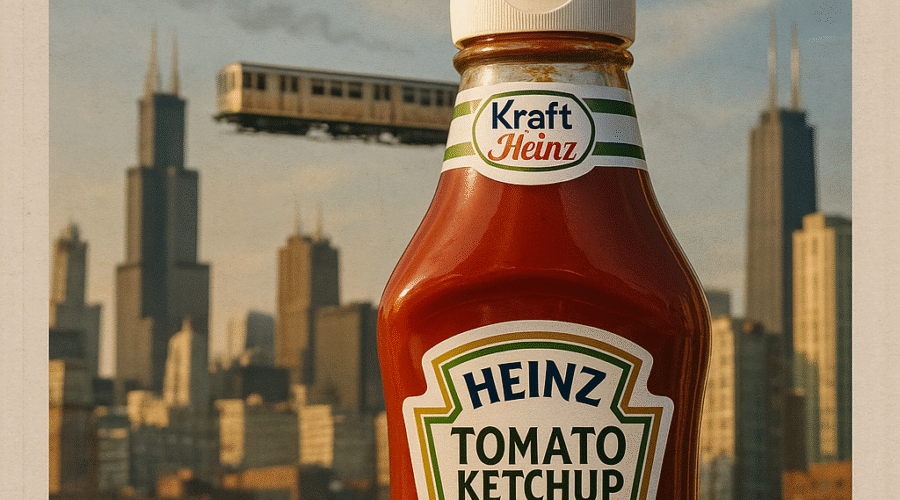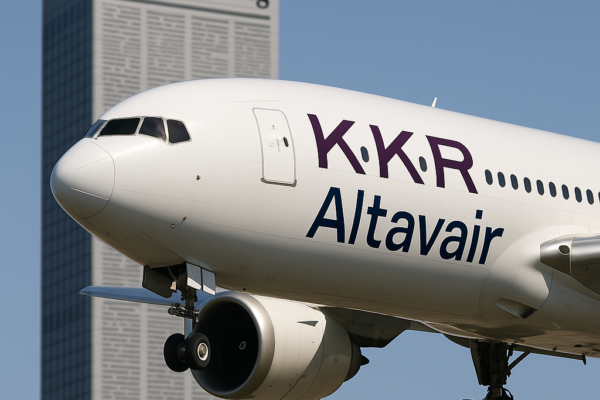The Kraft Heinz Company finds itself at a critical juncture as it navigates weakening demand for processed foods and shifting investor expectations. The packaged food giant announced on May 20, 2025, that it has been evaluating strategic transactions for several months to unlock shareholder value, coinciding with Berkshire Hathaway’s decision to relinquish its board seats[1][3][7]. This dual development signals a potential inflection point for the $33 billion market cap company, which has seen its stock decline 22% over the past year despite maintaining a 5.74% dividend yield[2][15]. The strategic review comes as consumer preferences shift toward healthier options and weight-loss medications disrupt traditional food consumption patterns[5][7][12].
Strategic Review and Portfolio Realignment
Drivers of the Strategic Shift
CEO Carlos Abrams-Rivera’s disclosure of ongoing strategic evaluations follows six consecutive quarters of declining sales, with Q1 2025 revenue missing estimates at $6 billion[2][15]. The company faces mounting pressure from multiple fronts: U.S. retail sales of processed meats declined 4.2% year-over-year through April 2025 according to NielsenIQ data, while input costs for ingredients like soybean oil and packaging materials rose 18% during the same period[12][16]. This perfect storm has forced management to consider radical portfolio changes, potentially mirroring its 2020 sale of natural cheese assets to Lactalis for $3.2 billion[8].
Oscar Mayer Divestiture Dynamics
Market speculation centers on the potential $3 billion sale of Oscar Mayer, with JBS and Sigma Alimentos emerging as leading bidders[10][11][16]. The processed meat division generates approximately $290 million in EBITDA, suggesting a valuation multiple of 10.3x based on current offers[10][16]. This potential divestiture aligns with Kraft Heinz’s strategy to shed slower-growth, commodity-exposed businesses while retaining higher-margin brands like Philadelphia Cream Cheese and Lunchables[9][12]. Historical precedent suggests such moves can create value – the 2012 Kraft-Mondelez split generated 14.6% annualized returns for shareholders through 2019[13].
Berkshire Hathaway’s Evolving Stake
Board Exit and Ownership Implications
Berkshire’s decision to withdraw directors Timothy Kenesey and Alicia Knapp reduces its influence while maintaining a 27.5% equity stake[7][14]. This move follows Warren Buffett’s 2019 admission of overpaying in the Kraft-Heinz merger, which resulted in a $15.4 billion writedown[7]. The board reduction to 10 members streamlines decision-making but removes Berkshire’s operational insights during a critical transformation period[3][7]. Analysts speculate this could presage a stake reduction, given Berkshire’s historical preference for control positions[14][18].
Once a CEO hungers for a deal, he or she will never lack for forecasts that justify the purchase. Subordinates will be cheering… Investment bankers, smelling huge fees, will be applauding as well. (Don’t ask the barber whether you need a haircut.) If the historical performance of the target falls short of validating its acquisition, large “synergies” will be forecast. Spreadsheets never disappoint.”
– Warren Buffett, 2018 Letter to Shareholders
Succession Planning Considerations
The board changes coincide with broader leadership transitions at Berkshire, where Greg Abel is set to assume the CEO role in 2026[18][20]. Abel’s previous resignation from Kraft Heinz’s board in 2024 suggests diverging strategic visions[7]. For Kraft Heinz, maintaining alignment with its largest shareholder while executing transformative deals will require careful navigation of Berkshire’s evolving governance priorities[17][19].
Financial Restructuring and Market Positioning
Capital Allocation Challenges
With $20.3 billion in long-term debt and a 4.7x net debt/EBITDA ratio, Kraft Heinz faces constrained financial flexibility[2][8]. The company’s $3 billion U.S. factory modernization program aims to achieve $1.2 billion in annual cost savings by 2027[15], but near-term cash needs may force difficult choices between dividend maintenance (currently consuming $2.7 billion annually) and growth investments[6][15]. Analyst Robert Moskow estimates that divesting Oscar Mayer could reduce leverage to 3.9x while freeing capital for acquisitions in faster-growing categories[9][12].
Category Transformation Strategies
Management’s “taste and nutrition” focus targets 4-6% organic growth in premium segments versus 1-2% in legacy categories[12]. Recent innovations include plant-based Lunchables and reduced-sodium cold cuts, responding to 62% of U.S. consumers prioritizing health attributes in food purchases according to a 2025 McKinsey survey[12][16]. However, these initiatives face stiff competition from newer entrants like Chobani and Beyond Meat, which grew sales 14% and 9% respectively in Q1 2025[12].
Industry Context and Competitive Landscape
Processed Food Sector Headwinds
The $1.2 trillion global packaged food industry faces unprecedented disruption. GLP-1 agonist medications used by 9% of U.S. adults have reduced caloric intake by 18-22% among users, according to IQVIA data[7][12]. Concurrently, private label market share reached 22.4% in U.S. grocery channels as of March 2025, pressuring branded manufacturers’ pricing power[9][12]. Kraft Heinz’s 3.2% price increase in Q1 failed to offset 4.7% volume declines, highlighting these challenges[15].
M&A Market Dynamics
The potential Oscar Mayer sale occurs amid heightened CPG deal activity, including Mars’ $36 billion acquisition of Kellanova and Smucker’s Hostess Brands purchase[11]. Food industry M&A multiples averaged 12.7x EBITDA in 2024, suggesting Kraft Heinz could command premium pricing for quality assets[8][16]. However, rising interest rates (5.25-5.5% Fed funds rate) and tightened lending standards may limit buyer financing capacity[12][16].
Leadership Strategy and Investor Implications
Abrams-Rivera’s Transformation Playbook
The CEO’s three-pronged strategy focuses on portfolio optimization, operational efficiency, and category innovation[3][12]. His background leading Kraft Heinz’s international divisions suggests potential for global brand expansion, particularly in Asia-Pacific markets growing at 7.3% annually[12][15]. However, execution risks remain high – the company’s 2024 venture into premium refrigerated snacks generated just $120 million in sales against $500 million projections[12].
Value Creation Opportunities
With shares trading at 12.7x forward earnings versus the 18.4x industry average, activists may push for more aggressive restructuring[2][14]. Potential scenarios include: 1) Full separation of international operations (23% of sales) through a Mondelez-style spin-off[13], 2) Accelerated automation investments to achieve 30% production cost reductions by 2027[6][15], or 3) Strategic partnerships with meal kit providers to access younger demographics[12]. Each path carries distinct risks in an environment where 68% of institutional investors prioritize stable dividends over growth initiatives[15].
Conclusion: Navigating the New Food Economy
Kraft Heinz’s strategic crossroads reflect broader industry realignment as consumer preferences and capital markets evolve. The company’s ability to monetize non-core assets while reinvesting in growth categories will determine whether it can close its 35% valuation gap versus peers[2][14]. With Berkshire Hathaway reducing governance ties and activists circling, management must articulate a clear path to mid-single-digit organic growth while maintaining investment-grade credit metrics. The coming 12-18 months will prove critical in determining whether this 150-year-old food icon can adapt to 21st-century market realities.
Sources
https://www.morningstar.com/news/dow-jones/2025052010248/kraft-heinz-evaluating-strategic-transactions-berkshire-hathaway-steps-away-from-board-update, https://www.investing.com/news/company-news/kraft-heinz-evaluates-strategic-options-board-reshuffles-93CH-4055744, https://www.businesswire.com/news/home/20250520339127/en/The-Kraft-Heinz-Company-Announces-Ongoing-Evaluation-of-Strategic-Transactions-to-Unlock-Shareholder-Value, https://seekingalpha.com/news/4450709-kraft-heinz-considering-strategic-options-to-unlock-value, https://kfgo.com/2025/05/20/kraft-heinz-looking-at-ma-opportunities-as-packaged-foods-demand-slows/, https://www.youtube.com/watch?v=sR1Xmw4jdsQ, https://www.marketscreener.com/quote/stock/KRAFT-HEINZ-22816979/news/Kraft-Heinz-looking-at-M-A-opportunities-Berkshire-Hathaway-leaves-board-50016639/, https://www.rbccm.com/en/expertise/transactions/deal.page?dcr=templatedata%2Frbccm%2Fdeals%2Fdata%2F2022%2F07%2Fkraft_heinz_agrees_to_sell_its_natural_cheese_business_to_groupe_lactalis, https://www.just-food.com/features/why-kraft-heinzs-mooted-oscar-mayer-disposal-makes-sense/, https://www.foodbusinessafrica.com/jbs-sigma-compete-for-kraft-heinzs-oscar-mayer-business-in-us3b-sale/, https://www.foodbev.com/news/jbs-sigma-in-running-for-kraft-heinz-s-3bn-oscar-mayer-business-reuters, https://foodhq.world/issue-sections/latest-news/corporate-happenings/kraft-heinz-explores-sale-of-oscar-mayer-business-amid-strategic-refocus/, https://www.foodindustry.com/articles/why-kraft-split-into-two-companies/, https://www.gurufocus.com/news/2878535/kraft-heinz-khc-explores-strategic-moves-amid-board-changes, https://au.investing.com/news/company-news/kraft-heinz-evaluates-strategic-options-board-reshuffles-93CH-3852109, https://www.foodprocessing.com/ingredients/animal-proteins/news/55238476/reuters-jbs-sa-sigma-alimentos-among-potential-oscar-mayer-buyers, https://www.berkshirehathaway.com/govern/corpgov.pdf, https://www.berkshirehathaway.com/meet01/2025proxystatement.pdf, https://boardmember.com/buffetts-annual-letter-a-board-assessment-tool/, https://en.wikipedia.org/wiki/Berkshire_Hathaway





